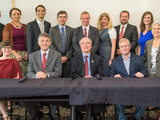Delegation aims to grow interdisciplinary exchange program
This story was first published on news.umbc.edu and was written by Sarah Hansen.
Eight administrators and faculty members from the University of Kassel in central Germany visited UMBC from August 29 to September 2 to build on a thriving university partnership between the two schools by continuing to cultivate broader research collaborations and student exchange programs.
Both UMBC and Kassel are young, innovative institutions known for promoting interdisciplinary programs and with particular strengths in STEM fields and the arts. “This visit is very important for us, as Kassel recognizes UMBC to be an international partner of strategic importance,” shares David diFuccia, professor of chemistry education at Kassel, at a lunch celebrating the partnership. “I hope our cooperation will grow and deepen, and that with every meeting we will take a step further.”
The partnership began when Matthias Gobbert, professor of mathematics at UMBC and a Kassel native, spent his sabbatical at Kassel during the 2011–2012 academic year. A memorandum of understanding (MOU) between the two universities’ math departments grew out of that visit, leading to fruitful exchanges of graduate students and faculty. In 2014, the MOU expanded to the university level, and undergraduate students have been studying abroad at each institution since fall 2015.
Karl Steiner, UMBC vice president for research, and Antonio Moreira, vice provost for academic affairs, have visited Kassel and discussed ways to grow the relationship, including development of a streamlined study abroad program. Now, Moreira says, “It’s truly expanding to the whole campus here at UMBC and at Kassel.”
Fields of study where UMBC and Kassel teams are already conducting complementary research and which are rife for collaboration include renewable energy, cybersecurity, nanoscience, remote sensing, and education. Other departments such as visual arts; economics; modern languages, linguistics, and intercultural communication (MLLI); and computer science are also exploring opportunities to partner.
Ellen Hemmerly, executive director of the bwtech@UMBC Research and Technology Park, discussed potential future business collaborations with the German guests. “We think global opportunities are really significant for companies,” she says, “so we’re always looking for natural ways to form partnerships.”
Both universities also see student academic exchange, beyond language classes, as a major priority in the partnership. Given course and lab research requirements, many students with majors in the hard sciences and engineering perceive study abroad as unrealistic—an option not truly available to them. However, UMBC and Kassel are committed to making it a clear and accessible process for students of any major. Julie Ross, dean of the College of Engineering and Information Technology, notes, “The things they’ll be working on in engineering and IT are global issues,” so it’s important for students to gain international exposure.
Study-Abroad-Fair16-8994
Susanne Sutton, coordinator of German in MLLI at UMBC, adds, “We have many STEM majors in our German classes. This is a tremendous opportunity for them to study abroad, as well as for students who are less familiar with the language and culture of Germany but have an interest in exploring it.”
Scott Casper, dean of the College of Arts, Humanities, and Social Sciences, is particularly excited to see his global studies students and Humanities Scholars travel abroad. “The problems our students are tackling are not limited to the U.S.,” he says.
Students in UMBC’s teacher education program, including those in the Sherman STEM Teacher Scholars Program, will also have opportunities to visit German schools and learn about teaching methods in Germany through collaboration with Kassel. In this digital age, “the students they will be teaching are global students,” says Casper, so it’s important teachers come to the classroom with a global perspective. The delegation also met with leaders of the Meyerhoff Scholars Program, who see excellent opportunities for their students to study abroad at Kassel.
The next step for the burgeoning UMBC–Kassel relationship is to expand the undergraduate exchange component. Already, many courses at the German university are taught in English, expanding the number of UMBC students who are able to complete discipline-specific coursework through an international exchange experience.
UMBC and Kassel are growing their cooperation steadily in many directions, with over a dozen faculty and staff working to make productive international exchanges possible for faculty and students on each side of the Atlantic. “When something comes together and it seems effortless,” says UMBC Provost Philip Rous, “you know that means a tremendous amount of effort has gone into it.”
UMBC students interested in learning more about study abroad should attend a Study Abroad 101 seminar offered twice a week by the Study Abroad Office, 2nd floor Administration building. Apply by October 10 to study abroad in the following spring semester.
Images: The University of Kassel delegation and UMBC representatives, August 30, 2016; students at UMBC’s Study Abroad Fair, September 2, 2016, interact with University of Kassel representatives. Photos by Marlayna Demond ’11 for UMBC.
Tags:
Posted: September 19, 2016, 10:43 PM
